Automotive Ultrasonic Radar and OEM Parking Roadmap Development Research Report, 2023
Automotive Ultrasonic Radar Research: as a single vehicle is expected to carry 7 units in 2025, ultrasonic radars will evolve to the second generation.
As a single vehicle is expected to pack 7 units in 2025, ultrasonic radars will take the fast lane.
According to the statistics of ResearchInChina, the ultrasonic radars installed in new passenger cars in China swelled by 7.4% year on year from 100.09 million units in 2021 to 107.525 million units in 2022. It is expected that the installation will exceed 140 million units by 2025. From 2021 to January 2023, there were an increasing number of ultrasonic radars installed in a single vehicle, up from 4.9 units to 5.6 units. Thanks to factors such as large-scale application of driving and parking integration, and the integration of cockpit and parking, it is expected that ultrasonic radars per vehicle will rise to 7 units in 2025, and the ultrasonic radar market will enjoy a boom.
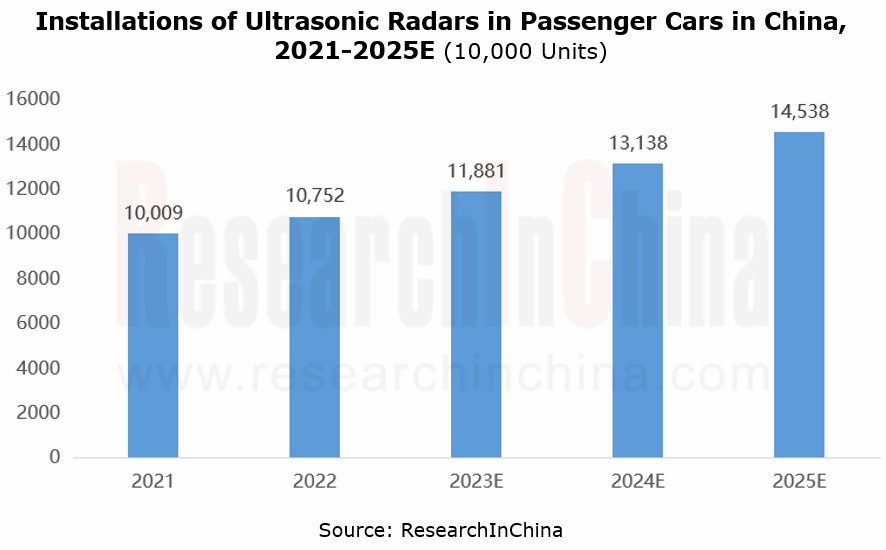
In terms of installed solutions, in 2022, 36.8%, 20.6% and 21.8% of new passenger cars in China carried 4-, 8- and 12-ultrasonic radar solutions, respectively; AVP used 12-ultrasonic radar solutions. In 2022, 28,804 vehicles with AVP were sold, rocketing by 589% on the previous year.
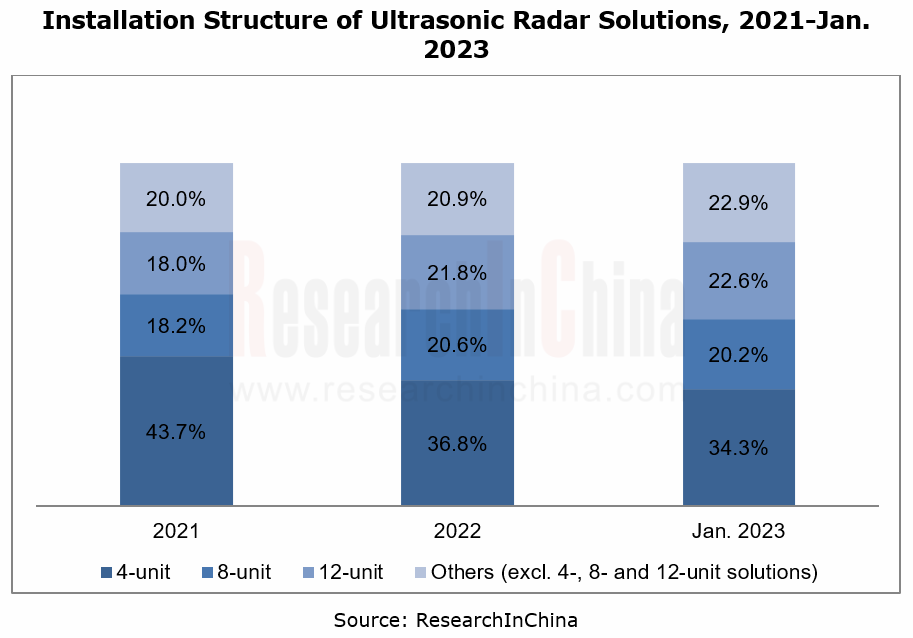
Ultrasonic radars evolve to the second generation - AK2 ultrasonic radar.
Amid the growth in installations and demand, ultrasonic radar technology is also advancing, and has iterated to AK2 ultrasonic radar. Compared with conventional ultrasonic radars, AK2 ultrasonic radar offers the following benefits:
Longer detection range (>5m), smaller blind spot (<10cm).
More echoes: DSI3 communication mode is adopted, providing the highest rate of signal propagation, up to 444kbit/s; at most 230 echoes can be supported in a sensor detection cycle.
Anti-interference
ASIL-B
Waveform coding
Multi-mode switching (for example, Longhorn AK2 supports three transmission modes: fixed frequency mode, rising delta frequency mode and falling delta frequency mode)
Diagnosis function (for example, Bosch's sixth-generation ultrasonic radar can detect hardware deafness).
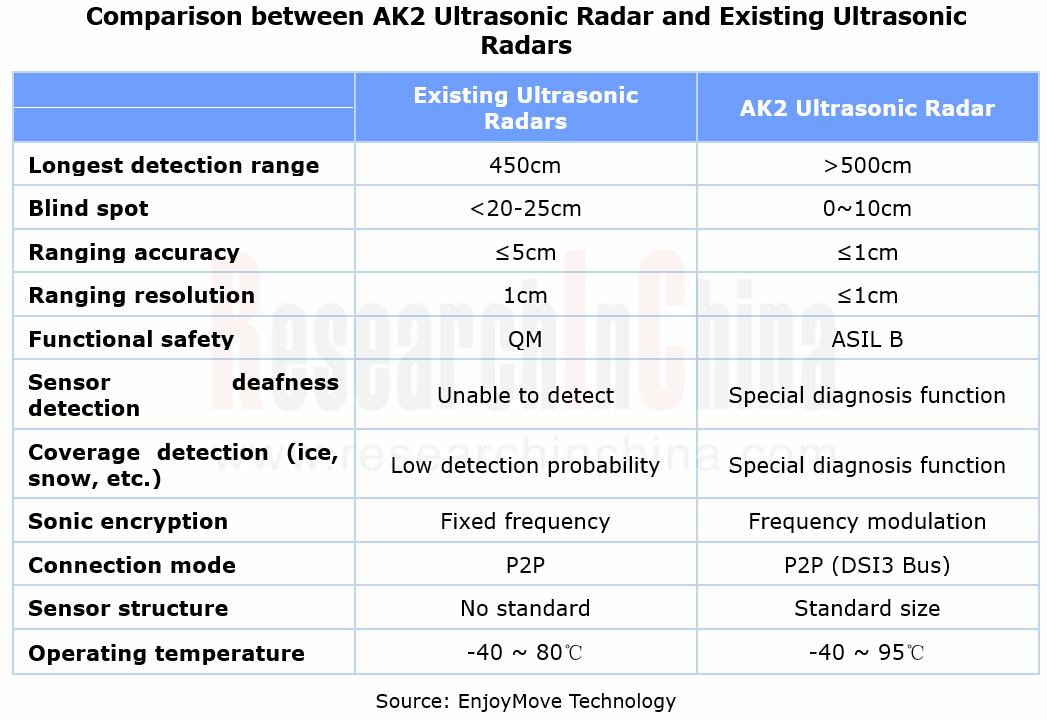
Regarding the AK2 layout, foreign manufacturers started earlier than Chinese companies. In 2016, Bosch successfully developed the sixth-generation ultrasonic radar, which combines digital signals and signal codes together and enables sensors to achieve multiple receptions and multiple transmissions through a linear frequency. Continental's full-stack solution based on its CUS3 ultrasonic sensor (with longest detection range of 5.5m, and self-diagnosis capability) is planned to be produced in quantities in 2024. The next-generation products of Murata Manufacturing can be used together with the ElmosE 524.17 driver chip to support frequency conversion (coding), with the blind spot only covering 15cm, and the longest detection range of 5.5m.
In China, both Audiowell Electronics and ZongMu Technology mass-produced AK2 radar in 2022; Coligen and Suzhou UDAS plan mass production in 2023; the rest companies are developing or have successfully developed AK2 radar.
Among them, the second-generation coded ultrasonic sensor of ZongMu Technology meets the German AK2 sensor appearance design standard. Through the Chirp (linear frequency modulation) coded transmission mode, the self-developed point cloud perception algorithm and probe enable the anti-noise capability of the system, with the refresh cycle in the encoding mode less than 100ms. The signal envelope helps to improve the detection of low obstacles such as ground locks and limiters. The product supports such functions as parking space monitoring, emergency braking, automatic space detection, target clustering and generation, and adaptive compensation of sensor performance parameters. The AK2 sensor was mass-produced in the second quarter of 2022, supporting customers like JAC Group, Voyah, Changan Automobile (Changan APA 7.0) and Seres.
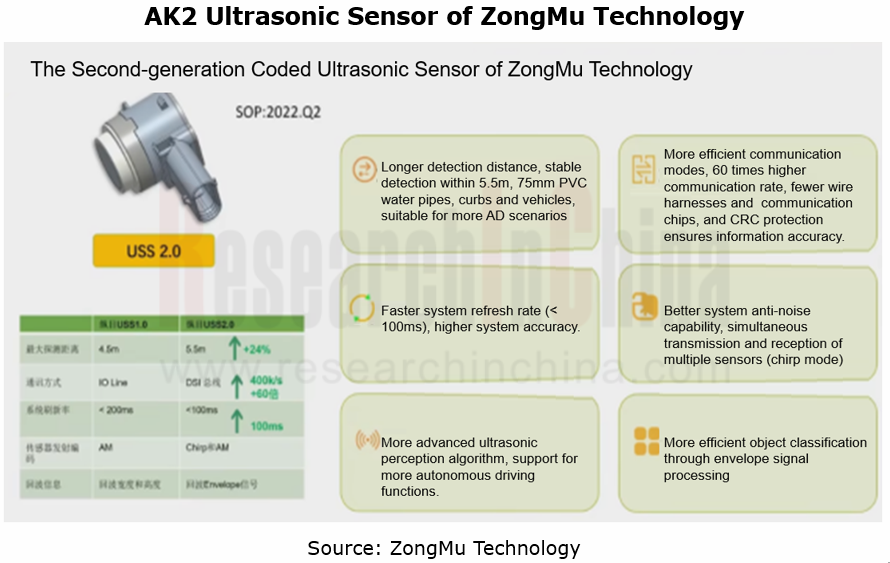
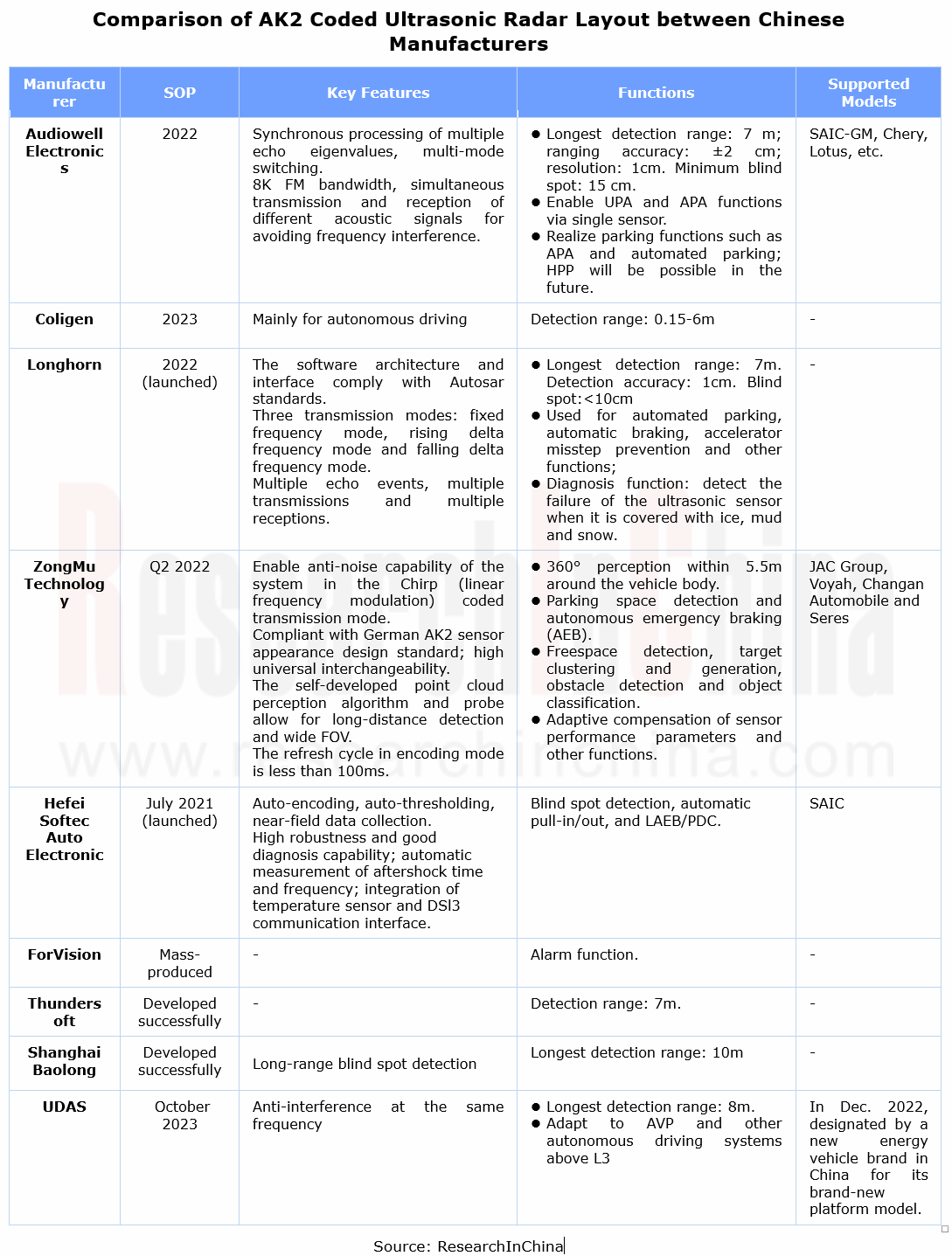
Will ultrasonic sensors be replaced by radars in the future?
In recent years, ultrasonic sensors have faced challenged from radars. For example, in 2022, O-Film Tech introduced a solution of applying radars to low-speed autonomous driving for the purpose of space perception, and enabled the parking function using its self-developed 77Ghz radar. In 2022, TransMicrowave unveiled a short-range point cloud imaging radar, which can output 4D (X, Y, Z, V) point cloud information and enables automated parking in the 4D point cloud AVP mode, with the localization accuracy of 2cm. Tesla even announced to globally remove ultrasonic radars from Model X and Model Y since 2023. Does this mean that ultrasonic radars will be replaced or no longer needed?
On the one hand, ultrasonic radars have a big cost advantage in short-distance ranging, and gain ever more competitive edges. Besides the iteration of AK2 ultrasonic sensor, ultrasonic radars tend to be miniaturized and hidden. One example is AW101, a MEMS ultrasonic sensor developed by Audiowell Electronics in November 2022, mainly used for rear occupant alert (ROA), sound controlled by gesture, VR&AR and so forth. The MEMS ultrasonic sensor is a new kind of sensor that integrates piezoelectric thin films (as functional thin films) with silicon-based MEMS for miniaturization, integration, and hidden installation. The micron-level functional films and millimeter-level devices of the sensor facilitate further integration, compounding and arraying, and make it easy to design SiP and SoC devices and built circuits in.
On the other hand, ultrasonic sensors are finding application in more scenarios from parking to in-cabin monitoring. For example, Coligen is expanding the application of ultrasonic sensors in wading warning, height limit warning, low-speed F/RAEB, load warning, reverse drive assist, and AVP based on multi-sensor fusion; Suzhou UDAS is also exploring the use of ultrasonic sensors in low-speed AEB, and high-speed lane change and blind spot detection.
Besides, multi-sensor fusion represents the development trend of autonomous driving technology. At present, vehicle intelligence is undergoing "cockpit and parking integration" and "driving and parking integration", and will see "cockpit and driving integration" soon. For them, ultrasonic radars should be integrated with different sensors to achieve different levels of functions. Examples include automated parking, enabled by “ultrasonic radars + surround view cameras” in the “cockpit and parking integrated” architecture; navigate on pilot and homezone parking pilot, enabled by “ultrasonic radars + multi-view cameras + radars” in the “driving and parking integrated" architecture; urban/end-to-end navigate on pilot, homezone parking pilot (across floors) and L2 AVP, enabled by “ultrasonic radars + multi-view cameras + radars” in the “cockpit and driving integrated" architecture.
Autonomous Driving Domain Controller and Central Computing Unit (CCU) Industry Report, 2025
Research on Autonomous Driving Domain Controllers: Monthly Penetration Rate Exceeded 30% for the First Time, and 700T+ Ultrahigh-compute Domain Controller Products Are Rapidly Installed in Vehicles
L...
China Automotive Lighting and Ambient Lighting System Research Report, 2025
Automotive Lighting System Research: In 2025H1, Autonomous Driving System (ADS) Marker Lamps Saw an 11-Fold Year-on-Year Growth and the Installation Rate of Automotive LED Lighting Approached 90...
Ecological Domain and Automotive Hardware Expansion Research Report, 2025
ResearchInChina has released the Ecological Domain and Automotive Hardware Expansion Research Report, 2025, which delves into the application of various automotive extended hardware, supplier ecologic...
Automotive Seating Innovation Technology Trend Research Report, 2025
Automotive Seating Research: With Popularization of Comfort Functions, How to Properly "Stack Functions" for Seating?
This report studies the status quo of seating technologies and functions in aspe...
Research Report on Chinese Suppliers’ Overseas Layout of Intelligent Driving, 2025
Research on Overseas Layout of Intelligent Driving: There Are Multiple Challenges in Overseas Layout, and Light-Asset Cooperation with Foreign Suppliers Emerges as the Optimal Solution at Present
20...
High-Voltage Power Supply in New Energy Vehicle (BMS, BDU, Relay, Integrated Battery Box) Research Report, 2025
The high-voltage power supply system is a core component of new energy vehicles. The battery pack serves as the central energy source, with the capacity of power battery affecting the vehicle's range,...
Automotive Radio Frequency System-on-Chip (RF SoC) and Module Research Report, 2025
Automotive RF SoC Research: The Pace of Introducing "Nerve Endings" such as UWB, NTN Satellite Communication, NearLink, and WIFI into Intelligent Vehicles Quickens
RF SoC (Radio Frequency Syst...
Automotive Power Management ICs and Signal Chain Chips Industry Research Report, 2025
Analog chips are used to process continuous analog signals from the natural world, such as light, sound, electricity/magnetism, position/speed/acceleration, and temperature. They are mainly composed o...
Global and China Electronic Rearview Mirror Industry Report, 2025
Based on the installation location, electronic rearview mirrors can be divided into electronic interior rearview mirrors (i.e., streaming media rearview mirrors) and electronic exterior rearview mirro...
Intelligent Cockpit Tier 1 Supplier Research Report, 2025 (Chinese Companies)
Intelligent Cockpit Tier1 Suppliers Research: Emerging AI Cockpit Products Fuel Layout of Full-Scenario Cockpit Ecosystem
This report mainly analyzes the current layout, innovative products, and deve...
Next-generation Central and Zonal Communication Network Topology and Chip Industry Research Report, 2025
The automotive E/E architecture is evolving towards a "central computing + zonal control" architecture, where the central computing platform is responsible for high-computing-power tasks, and zonal co...
Vehicle-road-cloud Integration and C-V2X Industry Research Report, 2025
Vehicle-side C-V2X Application Scenarios: Transition from R16 to R17, Providing a Communication Base for High-level Autonomous Driving, with the C-V2X On-board Explosion Period Approaching
In 2024, t...
Intelligent Cockpit Patent Analysis Report, 2025
Patent Trend: Three Major Directions of Intelligent Cockpits in 2025
This report explores the development trends of cutting-edge intelligent cockpits from the perspective of patents. The research sco...
Smart Car Information Security (Cybersecurity and Data Security) Research Report, 2025
Research on Automotive Information Security: AI Fusion Intelligent Protection and Ecological Collaboration Ensure Cybersecurity and Data Security
At present, what are the security risks faced by inte...
New Energy Vehicle 800-1000V High-Voltage Architecture and Supply Chain Research Report, 2025
Research on 800-1000V Architecture: to be installed in over 7 million vehicles in 2030, marking the arrival of the era of full-domain high voltage and megawatt supercharging.
In 2025, the 800-1000V h...
Foreign Tier 1 ADAS Suppliers Industry Research Report 2025
Research on Overseas Tier 1 ADAS Suppliers: Three Paths for Foreign Enterprises to Transfer to NOA
Foreign Tier 1 ADAS suppliers are obviously lagging behind in the field of NOA.
In 2024, Aptiv (2.6...
VLA Large Model Applications in Automotive and Robotics Research Report, 2025
ResearchInChina releases "VLA Large Model Applications in Automotive and Robotics Research Report, 2025": The report summarizes and analyzes the technical origin, development stages, application cases...
OEMs’ Next-generation In-vehicle Infotainment (IVI) System Trends Report, 2025
ResearchInChina releases the "OEMs’ Next-generation In-vehicle Infotainment (IVI) System Trends Report, 2025", which sorts out iterative development context of mainstream automakers in terms of infota...